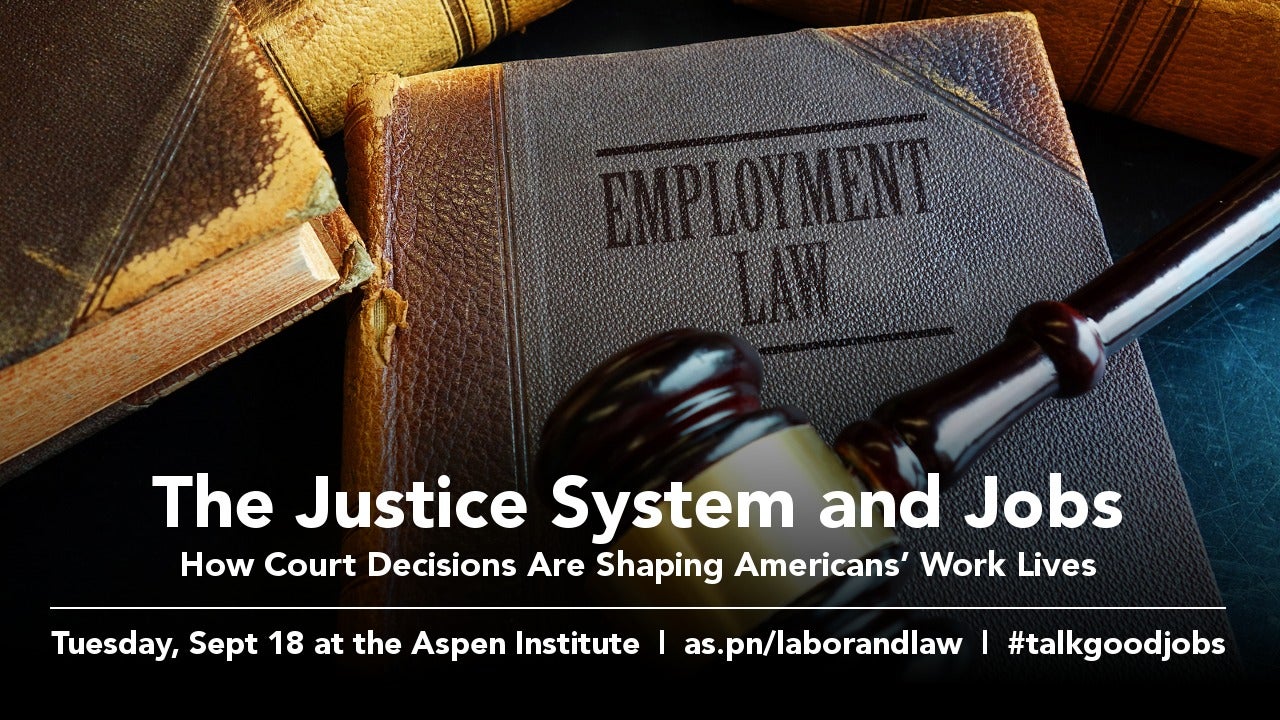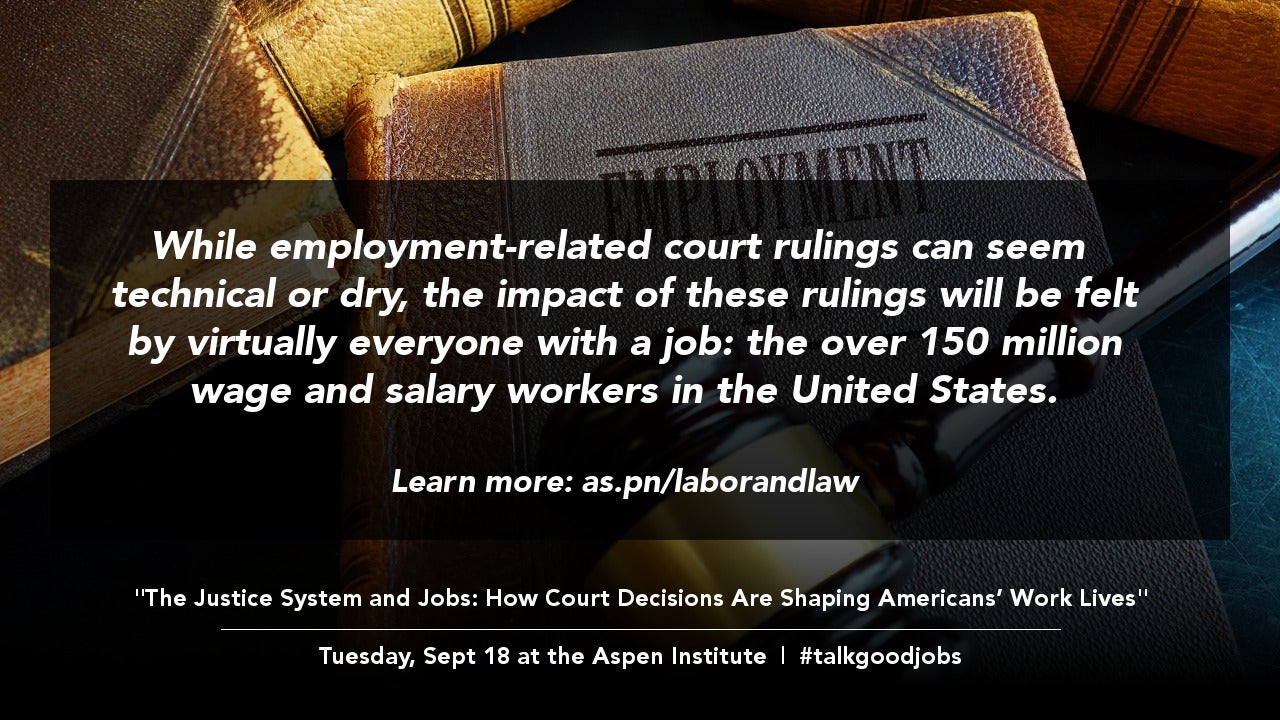The Justice System and Jobs: How Court Decisions Are Shaping Americans’ Work Lives
About this event
This Supreme Court term saw several high-profile cases in which the court adjudicated labor issues. The Janus decision, with its implications for public sector unions, and the Epic Systems decision, regarding the use of private arbitration, drew the media’s attention this year. Somewhat less widely covered were important decisions of lower courts, which have been adjudicating issues such as the validity of non-compete agreements, whether non-poach agreements among franchisees are legal, and what defines when a worker must be considered an employee. While these and other employment-related court rulings can seem technical or dry, the impact of these rulings will be felt by virtually everyone with a job: the over 150 million wage and salary workers in the United States.
Throughout history, courts have played a key role in interpreting and enforcing the rules that govern work, balancing the rights and interests of workers and those of the companies they work for. How courts strike that balance has changed over the years and has influenced the continuing evolution of the relationship between workers and employers.
In this event, we hear from legal and economic scholars and worker advocates about the critical role that courts have in setting the rules for the employer-employee relationship and the impact these decisions can have on individuals and the economy.
Featured speakers

Oren Cass @oren_cass
Senior Fellow, Manhattan Institute @ManhattanInst
Oren Cass is a senior fellow at the Manhattan Institute, where his work on strengthening the labor market addresses issues ranging from the social safety net and environmental regulation to trade and immigration to education and organized labor. Cass has written for publications including The New York Times, The Wall Street Journal, Foreign Affairs, and National Affairs, and he regularly speaks at universities and testifies before Congress. His forthcoming book, The Once and Future Worker: A Vision for the Renewal of Work in America, has been called “the essential policy book for our time” and “an unflinching indictment of the mistakes that Washington has made for a generation.” Before joining MI, he held roles as the domestic policy director for Mitt Romney’s presidential campaign in 2012, as an editor of the Harvard Law Review, and as a management consultant in Bain & Company’s Boston and New Delhi offices.

Sarita Gupta @saritasgupta
Co-Director, Jobs with Justice @jwjnational
Sarita Gupta is the Co-Director of Caring Across Generations, a national movement with over 200 national, state, and local partner organizations, working to transform the way we care for one another in America. Caring Across Generations harnesses the power of social action, social media, and storytelling to spark connections across generations, strengthen family and caregiving relationships, and advocate for policies that protect the dignity of seniors, people with disabilities, and the people who care for them. Sarita is also the Co-Director of Jobs With Justice. She is a nationally recognized expert on the economic, labor, and political issues affecting working people across all industries, particularly women and people employed in low-wage sectors, and on issues related to home care. As a member of the “sandwich generation,” Sarita is grappling with and can speak to the care issues facing more and more Americans, balancing caring for young children with caring for aging parents. She is a family care provider for her father who has Alzheimer’s. She lives in Silver Spring, Maryland with her husband, daughter, and parents.

Christine Owens
Executive Director, National Employment Law Project @NelpNews
NELP’s executive director since 2008, Christine Owens has devoted her career to fighting for the rights of America’s workers, and to expanding opportunities for women, people of color, and low-wage earners. In 1997, Chris joined the national AFL-CIO as a senior policy analyst specializing in workplace equity issues, and in 2001, she was appointed Director of Public Policy. In those roles, she worked closely with NELP and other national and grassroots economic policy and worker advocacy groups, along with national unions and state labor federations, to promote minimum and living wage hikes, pay equity for working women, and state UI coverage expansions, among other reforms. Prior to joining the AFL-CIO, Chris founded the Workers Options Resource Center, where she helped to coordinate a broad-based coalition of national and community organizations to win the 1996 federal minimum wage increase. Under her leadership, NELP and its partners have helped to secure more historic minimum wage increases throughout the country, crucial protections for millions of home-care workers, and ban-the-box hiring policies in dozens of states and localities.

Evan Starr @evanpstarr
Assistant Professor of Management & Organization, Robert H. Smith School of Business, University of Maryland @SmithSchool
Evan Starr is an Assistant Professor of Management & Organization at the Robert H. Smith School of Business at the University of Maryland. He received a Ph.D. in economics from the University of Michigan and a bachelor’s degree from Denison University. He originally hails from Claremont, California. Starr’s current research examines issues at the intersection of human capital accumulation, employee mobility, entrepreneurship, and innovation. In a recent set of projects utilizing employee-employer matched data and survey data that he and coauthors developed, Starr examined the use and impacts of noncompete agreements and their enforceability on the provision of firm-sponsored training, employee mobility and earnings, and on the creation, growth, and survival of new ventures.
Moderator

Lauren Weber @laurenweberWSJ
Workplace Reporter, Wall Street Journal @WSJ
Lauren Weber writes about employment and workplace issues for The Wall Street Journal, where her coverage has included the evolution of contracting and contingent work as labor models, legal issues in the workplace, the use of sophisticated pre-hire assessments, controversies surrounding the classification of independent contractors and employees, among many others. She arrived at The Wall Street Journal in 2011 after a stint as a private investigator. Lauren has also been a staff reporter at Reuters and Newsday, and her freelance work has appeared in The New York Times, Los Angeles Times, Chicago Tribune, and other newspapers. She is the author of In Cheap We Trust: The Story of a Misunderstood American Virtue, a cultural history of frugality in the United States.
Share
Tweet While employment-related court rulings can seem technical or dry, the impact of these rulings will be felt by virtually everyone with a job: over 150M wage & salary workers in the US. Learn more from @AspenWorkforce.
Tweet Throughout history, courts have played a key role in interpreting and enforcing the rules that govern work, balancing the rights and interests of workers and those of the companies they work for. Watch the event from @AspenWorkforce.
Tweet Hear from legal & economic scholars & worker advocates about the critical role that courts have in setting the rules for the employer-employee relationship and the impact on individuals and our economy. @AspenInstitute
Images
Join the conversation
Join the conversation on Twitter by following @AspenWorkforce and tweeting with the hashtag #talkgoodjobs.
Learn more
This event is part of the Working in America series, an ongoing discussion series hosted by the Aspen Institute Economic Opportunities Program that highlights an array of critical issues affecting low- and moderate-income workers in the United States and ideas for improving and expanding economic opportunities for working people. For more information, visit as.pn/workinginamerica.
Learn how the Economic Opportunities Program is helping low- and moderate-income Americans connect to and thrive in a changing economy. Follow us on social media and join our mailing list to stay up-to-date on publications, blog posts, and other announcements.



